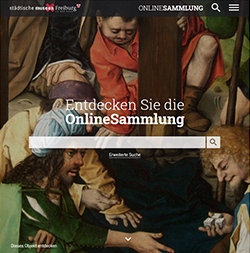Insights into the History of the Collection
Karl Sauer
10.2.1872 – 14.3.1917
Karl Sauer grew up in Whylen near Lörrach and moved with his family to Freiburg in 1891. Sauer was active in the German colonial service for many years and worked from 1898 until 1912 for the imperial government of the German East Africa protectorate (present-day Burundi, Rwanda, Tanzania [excluding the island of Zanzibar] and parts of Mozambique). He was temporarily stationed here in the important commercial and administrative centres of Bagamōyo, Dar es Salaam and Lindi (in present-day Tanzania). In his function as district commissioner and commissioner for labour, he participated in the construction of the East African Midland Railway, which was intended to increase the economic efficiency of the colony. During the Maji-Maji War (1905 – 1907) between the indigenous people and the German forces of occupation, Sauer, in his role as district commissioner, was involved in the military suppression of the insurrection toward the colony.
Succumbing to a tropical disease, he was forced to resign from his post in 1912 and return to Freiburg. Upon the outbreak of the First World War, he reported for military service once more. An injury led to a prolonged stay in a military hospital in Heidelberg, where he died on 14 March 1917.
Sauer Donation
Between 1904 and 1909, Karl Sauer donated extensive collections of carvings, weapons and musical instruments that he had acquired during his stays in German East Africa (present-day Burundi, Rwanda, Tanzania [excluding the island of Zanzibar] and parts of Mozambique). Of particular note is a collection of Makonde masks from Tanzania estimated to be worth 200 Marks at the time. A further donation in 1906 of ethnographic items from the regions Lindi and Bagamōyo (Tanzania) increased the value of his donation from 300 to 400 Marks. The collections were not systematically organised by Sauer and included ethnological objects as well as natural history specimens, such as animal skulls and insects. There is no extant documentary record detailing the circumstances of how the objects were obtained in Africa. In total, Sauer's donation was worth a total of 400 to 500 Marks.






